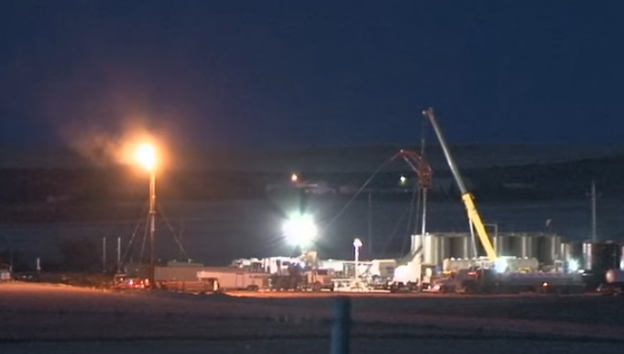March 28, 2022
Permission to republish original opeds and cartoons granted.
Blackrock CEO Larry Fink warns ESG investors Ukraine war causing ‘increasing oil and gas supply’ that will ‘slow the world’s progress toward net zero’ in near term

By Robert Romano
Blackrock CEO Larry Fink warned Environmental, Social and Governance (ESG) investors in his $10 trillion hedge fund’s annual shareholder letter that Russia’s invasion of Ukraine — and the resulting Western sanctions on Russia — had disrupted globalization and interdependent supply chains and would result in “increasing oil and gas supply” in the U.S. and “coal consumption may increase over the next year” in Europe and Asia to offset the drop in Russian exports.
As a result, Fink projected, “This will inevitably slow the world’s progress toward net zero in the near term,” referring to ESG goals like net zero global carbon emissions by 2050 that would encounter challenges, particularly as American consumers pay much higher prices with consumer inflation up 7.9 percent and producer inflation up 10 percent the past twelve months.
Those price pressures will mean more oil and gas production immediately, Fink said.
But, that understates the matter as Fink ignored a critical element to the war. The high energy inflation will also mean the public begins to question and examine ESG’s investment model to pursue social and climate justice that Fink has pushed to investors.
Restricting coal and nuclear energy has fostered European dependence on Russia particularly for natural gas and oil that, when the world is at war, becomes critical to national survival and the ability to project strength abroad. That dependency weakened the West’s response via sanctions as countries like Germany refused to end energy trade with Russia.
And it’s hard not to point to ESG as in part creating this vulnerability as a potential threat to national security.
The federal government the past seven years has opened the door for left-wing ESG investing via private retirement funds regulated under the Employment Retirement Income Security Act (ERISA) via a regulation by the Obama Labor Department in 2015.
The Obama rule allowed pension plan managers to give additional weight to companies touting ESG goals that focus on green energy, cleaning up the environment, are anti-oil, anti-coal, anti-carbon, but also anti-tobacco, anti-guns, embracing critical race theory, implementing diversity and inclusion racial and gender hiring quotas and practices and other left-wing issues.
Under President Joe Biden the $762 billion federal Thrift Savings Plan (TSP) for federal employee retirees will be investing in ESG funds as well going into effect in 2022, following state government employee retirement funds in California, New York, Colorado, Connecticut, Maine, Maryland and Oregon that have made similar investments for years.
Now, thanks to the incentives and subsidies, ESG funds, which total $38 trillion out more than $100 trillion global assets under management, will grow to $53 trillion by 2025, according to Bloomberg News, all push the Green New Deal.
And, in Fink’s eyes, as Europe moves away from dependency on Russian energy over the coming years, this will result in further “large-scale reorientation of supply chains [that] will inherently be inflationary.” And the higher prices would lead to even more green energy in the future: “Longer-term, I believe that recent events will actually accelerate the shift toward greener sources of energy in many parts of the world.” Why?
Particularly, the inflation of carbon-based energy would make green energy more price competitive and “meaningfully reduce the green premium for clean technologies and enable renewables, EVs and other clean technologies to be much more competitive economically,” Fink said.
In other words, a combination of the war, the sanctions and the longer lasting inflation they generate will further fuel ESG’s push for an all-green economy long term, the very green energy that caused the current supply crunch and energy security crisis in the first place — and seeded elements to the crisis in eastern Europe that made war more likely.
Hasn’t Wall Street learned its lesson?
It is this tension that must be addressed. Fink has underestimated the long term impacts that further restrictions on energy production and supplies are engendering: more projecting weakness, more global instability — and even higher prices. Fink thinks higher prices will make the world more green. Maybe he should be careful what he wishes for.
This could generate further public backlashes that makes pushes for greater carbon energy production more permanent.
Robert Romano is the Vice President of Public Policy at Americans for Limited Government Foundation.
Video: Biden gaffes and accidentally says the 82nd Airborne Division will soon be in Ukraine

To view online: https://www.youtube.com/watch?v=iJL1kkMlHDE

ALG Editor’s Note: In the following featured oped from The Hill, Faith & Freedom Coalition Director Timothy Head takes a look ahead at the 2022 Congressional midterms:

Timothy Head: Biden is handing the midterms to the GOP
President Biden is losing voters from key groups left and right, and this exodus of voters shouldn’t surprise anyone who has been paying attention. He made a lot of big promises to win in 2020 and has delivered on very few of them. Take a look at his State of the Union address, and you’ll find a long list of problems for which he failed to take responsibility..
Inflation is here to stay. Violent crime is up around the country. Biden’s chaotic withdrawal of troops from Afghanistan was nothing short of a catastrophe, with reverberations on the international stage, and with Russia’s war in Ukraine, we are again seeing the results of his failure to lead. The only thing Americans seem to be united around is their mutual disapproval of his administration’s performance — and some groups apparently have had enough.
Young, progressive Americans are steadily souring on Biden, according to The Economist. They want a president who will stick to his word, and Biden cannot meet their expectations.
In addition to the young progressives, independents are abandoning Biden in a similar fashion. They took notice early on during his time in office that he wasn’t accomplishing as much as he advertised during his campaign, according to an August 2021 poll by NBC News. Many suburban voters, another critical voting bloc, have withdrawn support from Biden as well — and the drop in suburban support is most glaring in states that will be key for Democrats this fall.
Hispanic voters are trending in the same direction. A December poll by The Wall Street Journal suggests that half of Hispanic voters would support a Republican candidate for Congress, compared to more than 60 percent of Hispanic voters who supported Democratic candidates in 2020. Just this week, the first Spanish-language conservative radio network launched. Hispanic voters are eager for more content that reflects their values.
All of these voters, it seems, are abandoning Biden because they’re tired of failure.
Democrats are likely watching his plummeting numbers with alarm — and for good reason. If these trends continue, the GOP should easily sweep the midterm elections in November. Democrats know this, in part because the voters who put Biden into the White House in 2020 aren’t likely to show up for the Democratic Party in 2022.
Biden promised to unite the country, but more than half of Americans think he is divisive. He vowed to end the pandemic; instead, he sent small businesses around the country into a financial crisis by prolonging pandemic-related restrictions. He pledged he would solve the crisis at America’s southern border, but he has just tried to hide it. He promised economic prosperity, but inflation has hit a 40-year high and gas prices just broke the national record. Ordinary Americans are bearing the brunt of this.
This kind of performance doesn’t make for a popular president, and it shouldn’t. More than half of Americans disapprove of him. Biden’s poor performance is an unflattering — but accurate — reflection of what the Democratic Party offers America.
To view online: https://thehill.com/opinion/campaign/599501-biden-is-handing-the-midterms-to-the-gop

